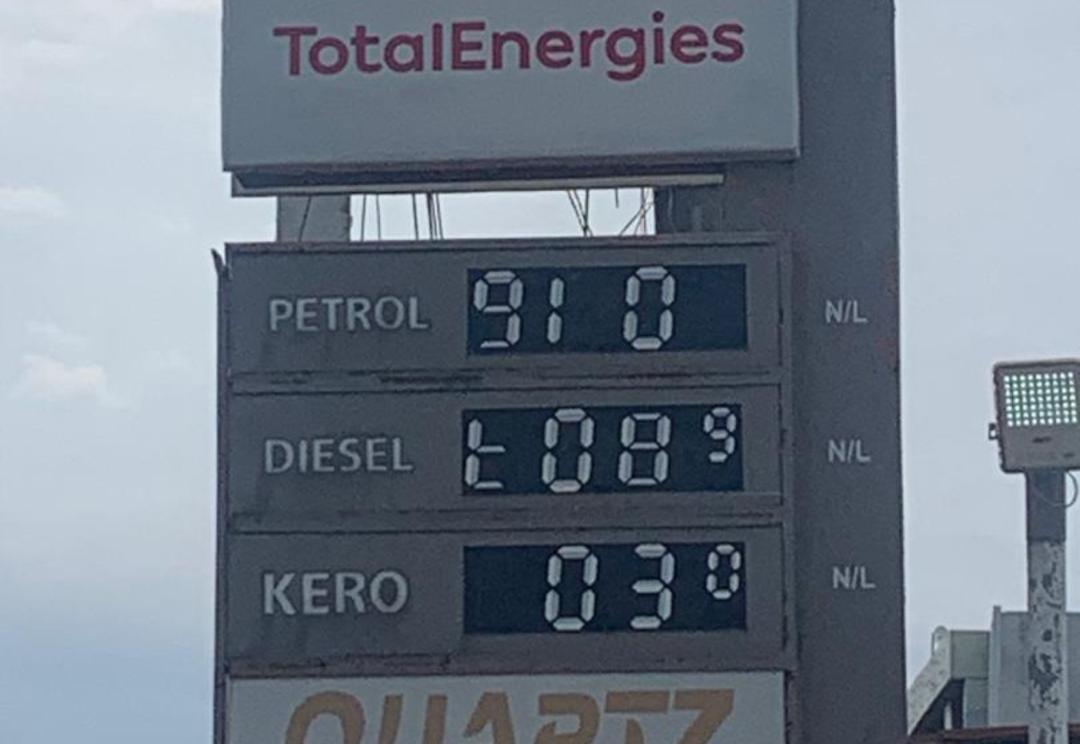
The current price at TotalEnergies filling station in Ilupeju, Lagos, on Monday. Photo by Fisayo Idowu
The Nigerian National Petroleum Company, NNPC, Limited and other petroleum marketers, on Monday, raised petrol pump price in Abuja and Lagos, following rise in crude oil price at the international market.
Checks around Abuja showed that NNPC retail outlets have raised the pump price by N50 from N895 per litre to N945. At AA Rano outlet in Area 8, Garki, pump price increased from N910 to N955 per litre, a hike of N45 per litre.
At Conoil in the Central Area, the price was raised by N45 from N900 to N945 per litre. TotalEnergies which dispensed at N929 per litre previously retained the old price, check at Zone 3, Wuse, retail station, showed.
Lagos
In Lagos, NNPC Limited increased the pump price of petrol to N915 per litre.
MRS filling stations, a Dangote refinery partner, increased the petrol price from N875 to N925 per litre in Lagos.
Also, TotalEnergies filling stations increased the price of petrol from N879 per litre to N910.
Speaking to Vanguard at Conoil, a motorist, Burka Galadima, Abuja, said Nigerians have to get used to fluctuations in the price of petrol given that the pricing system has been deregulated.
He said: “When the price went below N900 per litre, I was very happy and I was hopeful that it would even come down more. Unfortunately, the war between Israel and Iran has led to an increase in crude oil price. The new price is not surprising to me at all. I expected it after Dangote Refinery increased the price.
“I want the Federal Government to create a kind of buffer for us. Something to ensure price stability at a time like this. I’m not saying subsidy should come back but there must be something the government can do to keep the price lower and stable”, he added.
Consumers should understand this by now – IPMAN
Speaking to Vanguard, the Public Relations Officer, Independent Petroleum Marketers Association of Nigeria, IPMAN, Chief Chinedu Ukadike said the rise in price is “deregulation at work”.
He noted that consumers “should be used to this by now. The pump price is determined by a few factors. The most significant is the price of crude oil. Then you talk about exchange rate and other cost of operations”.
Speaking earlier on the impact of the Israeli-Iranian conflict on Nigeria’s oil industry, Partner at Kreston Pedabo, Olufemi Idowu said while the government would see a rise in revenue, petroleum products consumers would face a rise in price.
Idowu had warned that the major impact will occur in the downstream sector as the price of petroleum products would likely rise following the deregulation of the sector, pointing out Dangote Refinery still buys its crude oil feedstock at the international price.
“Despite the Crude for Naira policy, Dangote still buys at international price and if it is buying at international price, it means that crude oil sales to Dangote will be at a higher price. This means that the pump price of petrol is going to increase. And since the government is not subsidising despite having more money because it has been deregulated, it means the cost of goods and services will go up.
“So, why on one hand, the government may be celebrating higher revenue, the likely impact on consumers may be something they would not want to wish for,” he added.